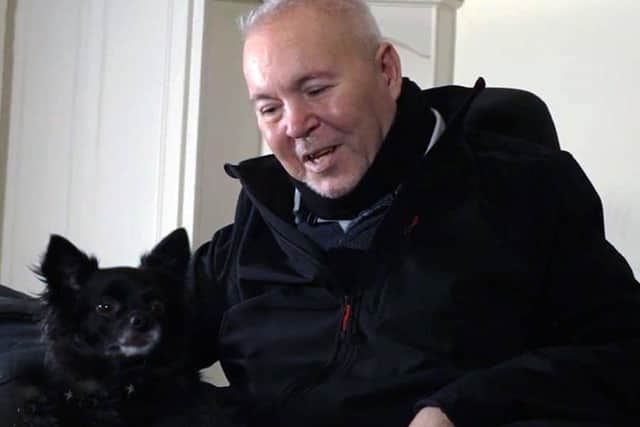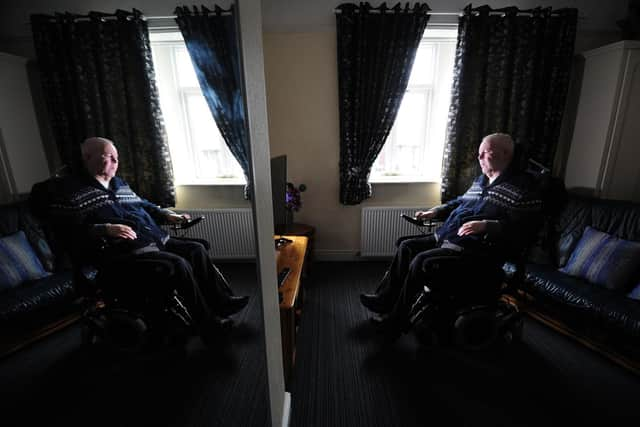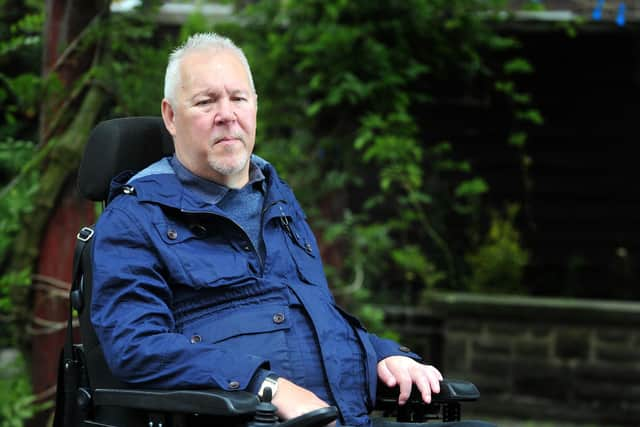Paralysed former builder from Leeds loses High Court challenge over assisted suicide


Paul Lamb, a former builder who was paralysed from the neck down in a severe car accident in 1990, lost his bid for assisted suicide on Thursday.
The 63-year-old has said previously that he lives "in a state of constant pain" and lost all functions below the neck, save for limited movement in his right arm, in the accident nearly thirty years ago.
Advertisement
Hide AdAdvertisement
Hide AdMr Lamb has previously appealed for the right to die with assistance back in 2014 - an appeal which was thrown out by the Supreme Court.


Challenging the 2014 decision, Mr Lamb again lost his bid at the High Court on Thursday.
Under current law, assisted suicide carries up to 14 years in prison.
Mr Lamb challenged this on the grounds it is discriminatory and breaches his human rights.
Advertisement
Hide AdAdvertisement
Hide AdHis lawyers told the court that, while an able-bodied person can end their life if they wish, those with severe disabilities cannot without help from those more able-bodied.


The London court ruled on Thursday that Mr Lamb's case was "unarguable" and should not proceed to a full hearing.
Lord Justice Dingemans and Mrs Justice Elisabeth Laing said a number of previous cases on the "immensely sensitive" issue have concluded the issue of assisted dying is a matter for Parliament and not the courts.
The judges said the rulings in cases including those of Diane Pretty, Tony Nicklinson and Noel Conway all found that the interference with their human rights was "justified".
Advertisement
Hide AdAdvertisement
Hide AdMrs Justice Laing said allowing exemptions to the law on assisted dying would remove protection of "very vulnerable people", some of whom would not wish to take their own lives but may be subjected to "pressure" to do so.


Mr Lamb, who needs round-the-clock care, was severely injured in a car accident in 1990 and has no function below his neck, apart from limited movement in his right arm.
In a statement in May, he said: "I am paralysed from the neck down and live in a state of constant pain.
"In the future my suffering will inevitably become too much to bear. When that happens, I want to be able to control and choose the circumstances of my death.
Advertisement
Hide AdAdvertisement
Hide Ad"As the law stands, my only option would be to die through the inhumane process of dehydration and starvation. This situation cannot be allowed to continue.
"Five years ago, I asked our courts to give me the right to control my own death and they told me to wait.
"Since then I have watched and waited as new evidence has emerged and progressive countries have given millions of others the choice I have asked for.
"And still the UK Parliament has done nothing. I have no option but to ask the court to intervene again. I need them to help me, and many others in my position, to end this cruel and discriminatory law."
Advertisement
Hide AdAdvertisement
Hide AdHis barrister, Philip Havers QC, told the court that discrimination to Mr Lamb as a result of the law is "very grave" and not being able to end his life means he faces "many more years of unbearable suffering".
He said: "It is important one remembers that is the consequence of the law as it stands, and the discrimination arises out of a grave disability, so the discrimination adds insult to injury."
Mr Lamb's case was supported by Humanists UK and he was represented by law firm Leigh Day.
He previously brought a case at the Court of Appeal, Supreme Court and the European Court of Human Rights alongside Jane Nicklinson, the widow of Tony Nicklinson, who took up her husband's legal fight after he died.
Advertisement
Hide AdAdvertisement
Hide AdMr Nicklinson, from Wiltshire, who suffered locked-in syndrome after a catastrophic stroke while on a business trip to Athens in 2005, died aged 58, days after his right-to-die challenge was rejected by the High Court in 2012.
Mr Lamb did not attend the hearing as he was in hospital.
Robert Ince, a spokesman for the campaign group My Death, My Decision, said: "We are extremely disappointed that the courts have once again failed to support the human rights of Paul and give hope to many like him who suffer intolerably.
"New evidence from progressive countries including Canada has demonstrated that a transparent and robust set of safeguards is the best way to protect everyone, and that compassion need not come at the expense of protecting others.
"Nearly 90% of the public now believe adults facing incurable suffering deserve to be treated with respect, dignity and compassion - but this cannot happen until the law changes."
Advertisement
Hide AdAdvertisement
Hide AdTrevor Moore, Chair of the campaign group My Death, My Decision, said: "The right to choice and control over how, when and where we die should be seen as a fundamental human right. But, for too long, our politicians’ aversion to this simple reality has forced people facing unbearable pain to suffer in silence - Paul now has raised his voice against it.
"New evidence from progressive countries including Canada has demonstrated that a transparent and robust set of safeguards is the best way to protect everyone, and that compassion need not come at the expense of protecting others. Nearly 90% of the public now believe adults facing incurable suffering deserve to be treated with respect, dignity, and compassion - but this cannot happen until the law changes.
"Paul has one of the strongest prospects of any case before him to break the deadlock on this manifestly unjust law, and we will be supporting him every step of the way."